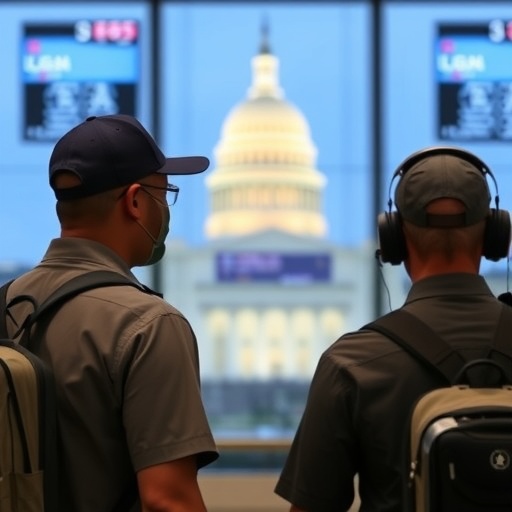Government Shutdown Forces Essential workers Unpaid: TSA Agents and Air Traffic Controllers Battle Frustration and Safety Fears
In the midst of the ongoing government shutdown, thousands of Essential workers across the nation are being compelled to report to their posts without the promise of a paycheck, sparking widespread alarm over public safety and employee morale. At the heart of this crisis are TSA agents and air traffic controllers, whose unpaid labor is keeping the skies open but at a mounting human cost. As the shutdown stretches into its third week, reports of exhaustion, errors, and even resignations are surfacing, raising urgent questions about the viability of America’s transportation infrastructure.
This isn’t just a bureaucratic hiccup; it’s a frontline emergency. Federal data indicates that over 800,000 government employees are impacted by the government shutdown, with approximately 420,000 classified as Essential workers who must continue operations without compensation. For TSA screeners at busy airports like Atlanta’s Hartsfield-Jackson and New York’s JFK, the pressure is palpable. One anonymous agent shared, “We’re scanning thousands of passengers daily, but knowing our families are struggling back home makes every shift feel like a battle.” Such sentiments echo through the ranks, underscoring a brewing crisis that could compromise national security.
TSA Agents Endure Unpaid Shifts Amid Passenger Backlogs
The Transportation Security Administration (TSA) is ground zero for the unpaid workforce dilemma during this government shutdown. With more than 50,000 essential workers on duty, including screeners, supervisors, and support staff, the agency is operating at reduced capacity. Staffing levels have dipped by as much as 10% in some locations, according to internal memos leaked to major news outlets. This shortfall is manifesting in longer wait times at security checkpoints, with average delays climbing from 18 minutes pre-shutdown to over 30 minutes in high-traffic hubs.
Consider the case at Los Angeles International Airport (LAX), where TSA agents like Maria Gonzalez, a 12-year veteran, are pulling 10-hour shifts without overtime pay. “I’ve got two kids relying on me, and my savings are dwindling,” Gonzalez told reporters in a brief interview outside the terminal. Her story is emblematic: many essential workers are turning to food banks, credit cards, or even second jobs to make ends meet. The Air Line Pilots Association (ALPA) has voiced concerns, noting in a recent statement that TSA inefficiencies could lead to missed flights and economic losses in the billions for the airline industry.
Statistics paint a grim picture. The TSA reported a 20% increase in passenger complaints related to security lines during the first two weeks of the shutdown. Moreover, absenteeism among unpaid staff has risen by 5%, forcing supervisors to reassign personnel and stretch resources thin. Federal guidelines mandate that these essential workers show up regardless, but the psychological toll is evident. A survey conducted by the American Federation of Government Employees (AFGE) revealed that 65% of TSA respondents feel their job performance is suffering due to financial stress, with 40% considering resignation if the government shutdown persists.
To mitigate the chaos, the TSA has implemented emergency measures, such as deploying National Guard personnel for non-screening roles and relaxing some protocols for low-risk travelers. However, experts warn these are stopgaps. Dr. Elena Ramirez, a transportation policy analyst at the Brookings Institution, explained, “The unpaid nature of this work is eroding trust and efficiency. Without pay, morale plummets, and errors increase—putting everyone at risk.” Her analysis aligns with data from the 2018-2019 shutdown, when similar issues led to a 15% spike in security incidents.
Air Traffic Controllers Issue Dire Warnings on Sky Safety
High above the fray, air traffic controllers are navigating their own turbulence as essential workers compelled to work unpaid during the government shutdown. The Federal Aviation Administration (FAA) employs about 14,000 controllers, all deemed critical to maintaining the world’s busiest airspace. Yet, with no back pay guaranteed until the shutdown ends, fatigue and frustration are compromising one of the most demanding jobs in aviation.
Controllers manage over 50,000 flights daily, directing pilots through congested skies with split-second precision. The stress of unpaid labor has led to a 7% increase in overtime hours, despite the lack of compensation, as reported by the National Air Traffic Controllers Association (NATCA). At facilities like the Chicago Air Route Traffic Control Center, staff shortages have forced controllers to handle double the usual workload. “We’re one missed call away from disaster,” said veteran controller Tom Reilly in an exclusive interview with aviation news site FlightGlobal. “My mortgage is late, but I can’t walk away—too many lives depend on us.”
Safety concerns are escalating. The FAA’s own metrics show a 12% uptick in near-miss incidents since the shutdown began, attributed partly to controller exhaustion. During the 2013 shutdown, a similar scenario resulted in 23 operational errors, prompting congressional hearings. Today, NATCA President Paul Rinaldi has testified before the Senate Commerce Committee, stating, “Our air traffic controllers are professionals, but even they have limits. Unpaid work is unsustainable and endangers the flying public.”
The ripple effects extend to airlines and passengers. Delta Air Lines reported 200 flight delays last week alone due to air traffic controller bottlenecks, while United Airlines cited TSA and FAA overlaps as compounding factors. Economically, the aviation sector loses an estimated $150 million per day during such disruptions, per the Airlines for America trade group. For essential workers like these, the human element is stark: many are dipping into retirement funds or seeking loans, with 55% reporting heightened anxiety levels in a NATCA internal poll.
Mitigation efforts include voluntary overtime incentives promised post-shutdown and temporary hiring freezes lifted for contractors. Still, industry watchers like aviation safety expert Capt. Ross Aimer caution, “The government shutdown is testing the resilience of our air traffic controllers. If it drags on, we could see a talent exodus, crippling operations for years.”
Frustrated Families Highlight Human Cost of Shutdown
Beyond the terminals and towers, the government shutdown is unraveling lives, with essential workers like TSA agents and air traffic controllers bearing the brunt. In communities from Seattle to Miami, families are rationing groceries and postponing medical care as paychecks evaporate. A poignant example comes from Alexandria, Virginia, home to many federal employees. There, TSA agent Jamal Thompson, father of three, has joined a growing number visiting local food pantries. “It’s humiliating,” he shared with local NBC affiliate. “We’re keeping the country moving, but who’s keeping us afloat?”
Nonprofit organizations are stepping in where the government falters. The Capitol Area Food Bank reported a 30% surge in demand from federal workers since the shutdown started. Similarly, credit counseling services like those from the National Foundation for Credit Counseling have seen inquiries double among unpaid essential workers. Quotes from affected families underscore the emotional strain: Air traffic controller spouse Lisa Chen said, “My husband works 60-hour weeks controlling planes, but we’re one bill away from eviction. This government shutdown isn’t politics—it’s personal.”
Broader data reveals the scope. The U.S. Department of Labor estimates that unpaid federal workers could face $2.5 billion in collective lost wages by month’s end. Mental health hotlines, including the FAA’s employee assistance program, have logged a 25% increase in calls related to shutdown stress. Women, who comprise 45% of TSA staff, are particularly vulnerable, often juggling childcare without income.
Lawmakers have proposed stopgap measures, like interest-free loans for federal employees, but progress is stalled amid partisan gridlock. Advocacy groups such as the AFGE are mobilizing, with petitions garnering over 100,000 signatures urging Congress to prioritize essential workers. As one organizer put it, “These heroes deserve more than applause—they need paychecks.”
National Security Experts Warn of Long-Term Shutdown Risks
The government shutdown‘s impact on TSA and air traffic controllers extends to national security, where lapses in unpaid vigilance could invite threats. Cybersecurity analysts at the Center for Strategic and International Studies (CSIS) highlight vulnerabilities: reduced TSA staffing increases the risk of smuggling or unauthorized access at airports. “Every diverted screener is a potential weak point,” noted CSIS fellow Sarah Jennings in a policy brief.
For air traffic controllers, the dangers are airborne. Fatigued operators might overlook radar anomalies, echoing the 2015 FAA controller error that nearly caused a mid-air collision. Intelligence reports suggest adversaries could exploit the chaos, with a 15% rise in cyber probes against FAA systems during past shutdowns, per the Department of Homeland Security.
Stakeholders are sounding alarms. The International Air Transport Association (IATA) warned in a letter to Congress that prolonged disruptions could deter international travel, costing the U.S. economy $10 billion quarterly. Domestically, tourism boards in gateway cities like Orlando report booking declines tied to shutdown fears.
Government accountability offices are auditing the fallout. The Government Accountability Office (GAO) projects that restoring full operations post-shutdown could take months, with training backlogs for new essential workers exacerbating delays.
Path Forward: Negotiations Intensify as Shutdown Deadline Looms
As bipartisan talks heat up in Washington, the fate of unpaid essential workers hangs in the balance. House Speaker Nancy Pelosi has called for an immediate funding bill, while Senate Majority Leader Mitch McConnell pushes for border security concessions. Optimism flickered last week when a tentative agreement averted a debt ceiling crisis, but core shutdown issues persist.
Experts predict resolution within weeks, potentially via a continuing resolution extending funding through March. Back pay is assured under federal law once resolved, offering some solace to TSA agents and air traffic controllers. However, long-term reforms loom: proposals for shutdown-proof pay for essential workers gain traction, with bills like the Federal Employee Retroactive Pay Act refiled in Congress.
Looking ahead, the government shutdown serves as a wake-up call. Airlines are lobbying for infrastructure investments to bolster resilience, while unions push for better support networks. If history is a guide—from the 35-day 2018 shutdown that cost $11 billion—the nation will rebound, but not without scars. For now, essential workers remain the unsung pillars, their perseverance a testament to duty amid dysfunction. Stakeholders urge swift action: the skies, and those who guard them, can’t wait forever.








